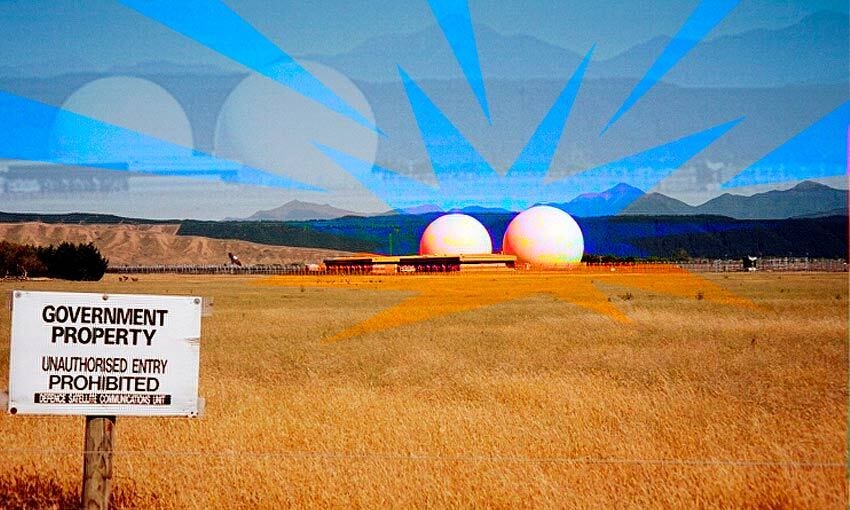NZ’s disinformation surge
Disinformation expert Kate Hannah talks about new research that shows Covid-19 conspiracy theories and violent imagery are spreading fast in New Zealand
Mōrena and welcome to The Bulletin for Friday, November 12, by Justin Giovannetti. Presented in partnership with Z Energy.
In today’s edition: Government sued for oil and gas permits; new poll is bad news for Labour; AstraZeneca vaccine available for all; but first, growing disinformation.
A man holds a sign with a popular US right-wing slogan, code for 'Fuck Joe Biden', during a protest at parliament this week. (Hagen Hopkins/Getty Images)
The surge in New Zealand’s disinformation. Earlier this week a poll on the social media app Telegram claimed that 98% of New Zealanders want Jacinda Ardern removed from office and asked what her punishment should be. The leading option was hanging, with people also calling for a firing squad or public stoning. It wasn’t a joke, and is instead a small window into growing levels of disinformation (false information, meant to harm) in New Zealand.
On Tuesday, the same day a protest was held outside parliament, researchers at Te Pūnaha Matatini released a worrying report that Covid-19 disinformation is spreading rapidly, fuelled by increasingly racist and violent imagery. Kate Hannah, an author of the report and expert in disinformation, spoke with me about what’s happening online.
What has changed? About a month after Auckland entered lockdown, Hannah spoke with this newsletter about misinformation (false information, but not meant to harm) being seen at the time. It followed a warning from the chief censor that misinformation was on the rise. Hannah was relatively upbeat then, reporting that there was some misinformation, but New Zealand is small and people were generally looking out for each other online. Over the past two months everything has changed.
“It has just increased, to be honest, so much in the last two to three weeks, since the announcement of the vaccine mandate. That was a massive spike in engagement for people following and subscribing to groups on Telegram and engaging with content. It’s exponentially rising now, day on day. The amount of data we’re trying to go through now is near impossible,” she said.
The scope of disinformation. According to the TPM report, more disinformation has been detected over the past three months than during the entirety of the pandemic before the delta outbreak. It’s throughout New Zealand and not focused in any particular region. Much of the increase followed the government’s announcement in late October that it was extending a vaccine mandate to cover nearly 40% of all workers. Along with being more widespread, it’s also more targeted, and the language is more violent, according to Hannah.
“There is live time stalking of the prime minister, telling people where she’s been spotted and then telling people to go find her. In terms of the volatility, it feels very dangerous. Everyone is waiting for something to pop off and until it does, it’ll continue to feel like that,” she said.
Who might be behind the spreading? Much of the disinformation swirls around a perceived lack of vaccine safety and, conversely, calls to use unrelated drugs to treat or prevent Covid-19. However, much of the online conversation also branches off into other directions, often related to American conspiracy theorists like QAnon. According to Hannah, some of the movement today is based on those groups, along with a helping of white supremacy, fascism and misogyny. Nicky Hager writes in The Spinoff today about being troubled by good, principled people who joined a “fascist protest” at parliament.
Hannah adds: “For a lot of people watching the parliament protest on TV, it was a revelation to see all the Nazi and Trump imagery. A lot of people were surprised by that, but the movement has been partially overtaken and pushed by those ideologies and that’s becoming apparent. At the same time, people that have fears about their futures and people facing job losses because of the vaccine mandate have been red pilled”. A person who has been red pilled has had their perspective dramatically shifted. In the conspiracy theory space, that shift is often from genuine concern to ill-informed and dangerous conviction.
“We keep telling ourselves it’s a small minority, but it’s worrying for New Zealand’s social fabric,” she said.
Should we be concerned? Speaking with Hannah I was struck by a story I’d read earlier this week out of Glasgow, where the Cop26 climate summit is being held. Some activists at the summit were arguing that the entire world doesn’t need to be convinced to battle for the climate, only 3.5%. Erica Chenoweth, a political scientist at Harvard, has found that 3.5% of a population mobilised for protest is enough to move a government to action. I put the question to Hannah: why is a small minority in Glasgow seen as a viable movement to change the world while a small minority outside parliament is considered best ignored?
“I don’t want to be a doomsayer, but a very small and very committed minority of people have changed the world, for the good and for the bad, throughout human history. It will take more people caring, and doing more, to actively resist Covid disinformation. I do have cultural concerns about New Zealanders who generally want to let things slide,” she said.
On a positive note, nothing seen so far would indicate that anywhere near 3.5% of New Zealanders are actively engaged in Covid-19 conspiracy theories.
A message from The Spinoff’s new editor Madeleine Chapman:
Like any good door-to-door salesperson, I’m about to cheerily introduce myself and then, in the very next breath, ask you for money. Hi! I’m Madeleine (or Mad) Chapman, previously an intern at The Spinoff, then a staff writer, senior writer and now editor. It certainly wasn’t the plan to step into this role in the middle of a delta outbreak, nor did I think my first weeks on the job would unfold alongside New Zealand’s largest city slowly coming out of stagnation. But despite the strange and unfortunate circumstances, The Spinoff team has stepped up once again, working tirelessly (and mostly from our bedrooms) to bring you the most important news when you need it, and the lighter moments when things are looking a little bleak. We’ve been able to continue this work because of the ongoing contributions from our members and I can’t thank you enough.
But I can boldly ask that you consider becoming a member if you aren’t one already. If you’ve read something on our site recently that you enjoyed or appreciated, consider it a koha for that alone, because every dollar donated through The Spinoff Members is used to create more of the work you see every day. With Christmas around the corner (which I’m finding genuinely hard to believe), there’s no such thing as shipping delays on a membership of The Spinoff bought for whānau and friends.
NZ barred from core membership of fossil fuel abolition group because of ongoing exploration. Stuff reports New Zealand was granted associate membership in the Beyond Oil and Gas alliance after the government handed out new 10-year permits for oil and gas exploration this year. Core members have put a stop to the possibility of new fossil fuel extraction. The inclusion in the pact was announced at the Glasgow climate summit, but was overshadowed by news that students are suing the government over the new gas permits.
The Covid numbers: There are 84 cases in hospital and 10 in ICU/HDU. There are now 3,064 active cases in New Zealand. 152 new community cases were reported in Auckland yesterday, 25 in Waikato and 8 in Northland. 22,007 people were vaccinated on Wednesday.
The Spinoff’s Covid data tracker has the latest figures.
Prime minister’s popularity falls as Covid is here to stay. Claire Trevett writes in the NZ Herald (paywalled) that plunging poll numbers help explain the dilemma being faced in the Beehive. Despite a worsening outbreak and a health system that’s overwhelmed by home isolation, politicians are adamant on relaxing restrictions for the summer. Labour is now hovering around 40% support, but the country’s optimism is gone. Three-quarters of New Zealanders think the worst is yet to come and a minority think the government is handling the situation well, both are a significant change from the golden days of elimination last year.
Anyone will be able to get the AstraZeneca vaccine. In an abrupt about-face, the Covid-19 minister has confirmed any New Zealander aged over 18 will now be able to request a dose of the AstraZeneca jab, Stuff reports. On Wednesday, the director-general of health had stressed that only people with a valid medical reason would be allowed to get it. The AstraZeneca vaccine has more side effects and is less effective than Pfizer’s dose, which will remain the default. However, it doesn’t use newer mRNA technology, which has been a point of concern for some vaccine hesitant people.
France has delayed a New Zealand-European Union trade deal. Jacinda Ardern had planned to visit Europe this month, partly to advocate for the deal, but it now appears to be on ice, according to the Financial Times (hard paywall). As the NZ Herald (no paywall) also reports, the French president has told the EU to delay negotiations until after next year’s presidential election campaign in his country. Securing the deal had been a priority for the Beehive.
How good is our public service? BusinessDesk has launched an investigative project that looks at the state of New Zealand’s public service. While on paper it might be considered the second best in the world, really, there are flaws and misconduct. In a series of articles, a number of reporters looks at what’s working and what isn’t. In a sign of what isn’t working, the housing minister had to dob in her own department yesterday after Newshub revealed improper conduct from officials. “We can just act as though we don't know anything!” isn’t a phrase you ever want to see appear in an official email.
Got some feedback about The Bulletin, or anything in the news?
Get in touch with me at thebulletin@thespinoff.co.nz
Right now on The Spinoff: Catherine Woulfe thinks up 20 ways the spyglobes at Waihopai station can be repurposed. Justin Latif reports on Pacific doctors fighting misinformation on TikTok. Sam Brooks looks at the predictions made by Metal Gear Solid 2, a game released two decades ago. Charlotte Muru-Lanning writes a fail-safe guide to late-night snacking. Janaye Henry & Leonie Hayden produce an essential list of 2021 Kirihimete gift ideas.
All Blacks put forward strong squad for clash with Ireland. The NZ Herald reports that the team is preparing for a mighty challenge in Dublin with its first-rate squad. Coach Ian Foster has turned to experience and strength, pairing Anton Lienert-Brown with Rieko Ioane in the midfield, while ensuring Beauden Barrett is there as well. It’ll be a strong showing for the All Blacks.
That's it for The Bulletin. If you want to support the work we do at The Spinoff, please check out our membership programme.







